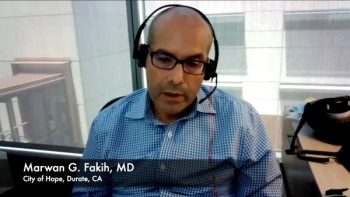
At ASCO 2021, Stephen Liu, MD, talked about treating patients with EGFR-mutant non–small cell lung cancer in the post-osimertinib setting with the combination of amivantamab and Lazertinib.

Your AI-Trained Oncology Knowledge Connection!


At ASCO 2021, Stephen Liu, MD, talked about treating patients with EGFR-mutant non–small cell lung cancer in the post-osimertinib setting with the combination of amivantamab and Lazertinib.

The updated results of an ongoing phase 1/2 study indicated that CA-4948 achieved promising responses and a tolerable safety profile in patients with relapsed/refractory acute myeloid leukemia and myelodysplastic syndromes.

Julian Adams, PhD, discusses the potential of Omidubicel for patients with hematologic cancers such as lymphomas and leukemias.

More elderly, frail patients with colorectal cancer were able to complete adjuvant chemotherapy following geriatric intervention.

Robert A. Figlin, MD, details how his institution, Cedars-Sinai Cancer, is aiming to fully understand the cancer journey for those with genitourinary malignancies.

An expert in treating breast cancer discusses potential therapy options for patients with HER2-mutant.

Preliminary data from the phase 1b GO30103 study indicated that the combination of tiragolumab plus atezolizumab may have promise in patients with heavily pretreated metastatic esophageal cancer.

The FDA approved the combination of daratumumab and hyaluronidase-fihj plus pomalidomide/dexamethasone as therapy for certain patients with pretreated multiple myeloma.

At ASCO 2021, Tanios S. Bekaii-Saab, MD, talked about some of his research in patients with IDH1/2–positive cholangiocarcinoma presented at the meeting.

An oncology pharmacist details the unique mechanism of active of tazemetostat in the treatment of follicular lymphoma.

At ASCO 2021, Shaji Kumar, MD, talked about the impact of adding daratumumab maintenance to therapy for patients with newly diagnosed multiple myeloma in the CASSIOPEIA trial.

Eric J. Sherman, MD, highlights trends he observed with immunotherapy in the head and neck cancer space.

During a discussion at ASCO 2021, Mounzer Agha, MD, talked about mitigation strategies used by the investigators from the CARTITUDE-2 trial to prevent cognitive and neuro-movement disorders commonly associated with CAR T-cell therapy.

Enfortumab vedotin-ejfv has been approved by the FDA for locally advanced or metastatic urothelial cancer.

This year’s Annual Report to the Nation on the Status of Cancer highlights trends in cancer incidence and mortality overall and in key patient subgroups.

Despite some delayed immune responses, the Pfizer COVID-19 vaccine appears safe and effective in patients with cancer who are receiving treatment for their disease.

Results from the phase 3 KEYNOTE-811 study indicated that pembrolizumab and trastuzumab plus chemotherapy yielded robust, long-lasting responses in patients with HER2-positive metastatic gastric or gastroesophageal junction cancer.

CancerNetwork® sat down with Marwan G. Fakih, MD, of City of Hope at the 2021 ASCO Annual Meeting to talk about a potential multidisciplinary treatment approach to colorectal cancer with regorafenib/nivolumab.

Robert A. Figlin, MD, highlights toxicities that patients with renal cell carcinoma experience while on cabozantinib.

At the end of 2020, investigators saw more patients being screened for cancer compared with the beginning of the year, although racial and economic disparities still exist for certain tests.

The FDA has requested a partial clinical hold on all trials featuring melflufen following the updated results of the phase 3 OCEAN study in relapsed/refractory multiple myeloma.

The FDA released a final guidance on evaluating cancer drugs in patients with central nervous system metastases.

Moreau detailed the patient characteristics of those enrolled on the CASSIOPEIA trial, which investigating bortezomib, thalidomide and dexamethasone plus daratumumab in patients with newly diagnosed multiple myeloma.

The FDA supported Athenex to continue developing oral paclitaxel and encequidar for patients with metastatic breast cancer.

The pharmaceutical company plans to voluntarily withdraw the accelerated approval indication for pembrolizumab in the third line setting for patients with gastric cancer within the coming months.

A dose-escalation schedule for neratinib may help some patients with HER2-positive breast cancer better manage severe diarrhea resulting from treatment.

In a trial of patients with chronic lymphocytic leukemia, small lymphocytic lymphoma, and other hematologic cancers, the BCL-2 inhibitor lisaftoclax demonstrated feasibility as a treated option in the relapsed or refractory setting.

Patients with KRAS-positive NSCLC being treated with rigosertib plus nivolumab demonstrated early efficacy of the combination in a phase 1/2a trial.

Eric J. Sherman, MD, of Memorial Sloan Kettering Cancer Center highlights research on adjuvant capecitabine in nasopharynx cancer.

CancerNetwork®’s podcast hosted 2 experts to discuss the current state of biosimilar prescriptions and the need for change to improve the system overall.